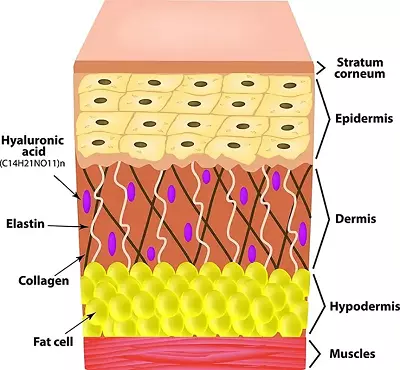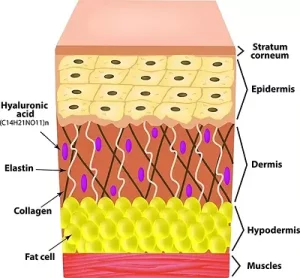Verify Your Email Address
Please ensure to verify your email for confirmation. We recommend checking your spam and trash folders as well.

The state of the stratum corneum is an important factor in determining the state of the skin and the amount of skin sebum is another important factor. In the past, skin conditions were usually divided into three categories: dry skin, normal skin, and oily skin, based only on the moisture content of the stratum corneum. Moisture and oiliness of the skin exist independently. Adequate moisture content in the stratum corneum is the result of healthy and normal keratinization of the stratum corneum. The oiliness of the skin is determined by the secretion of sebum. Therefore, the new classification method can be divided into 5 skin types which are normal skin, oily skin, dry skin, combination skin, and sensitive skin respectively according to the skin sebum amount, moisture content, and skin properties related to people’s age, season and lifestyle. So what is my skin type?

The amount of sebum and sweat glands secreted by neutral skin is moderate, which is ideal skin with a good balance of moisture and oil; the skin texture is smooth, not thick or fine, the cortex is smooth, not dry or greasy, and the skin is smooth, tender and elastic; Smooth sebum secretion, healthy and shiny skin; fewer blemishes on the skin surface, pH value between 5 and 5.6, easy to apply makeup; according to the season, environment, food, and hormone secretion factors in the body, the skin condition changes somewhat (dry skin when it is cold, oily skin when it is hot); it is less sensitive to external stimuli.
This type of skin should pay attention to hydration in summer and oil in winter. If it is not properly maintained, it will easily become a combination skin.
This type of skin has exuberant sebaceous gland secretion, more sebum secretion, high sebum, and moisture content, oily and bright appearance, thicker skin texture, large pores, darker complexion, and is not easy to wrinkle and age; however, due to excessive secretion of oil, the accumulation in the hair follicle cannot be smoothly discharged, and it is easy to absorb dust in the air, pollute the pores, weaken the ability of resistance to bacteria, and grow acne; the pH value of this type skin is between 5.6 and 6.6. Makeup comes off easily.
During the skin care process, special attention should be paid to the cleaning of the skin. Cleaning products with strong detergency can be used, and skin care products with less oil are used to prevent clogging of pores, inducing acne and hair follicle inflammation, and promoting the keratinization of the capsular skin to make sebum secretion normal.
Dry skin is characterized by less sebum secretion, less water content in the stratum corneum, no greasy feeling on the skin surface, dull skin, tightness and lack of elasticity, small pores, fair and delicate skin, and often dry and wrinkled around the eyes and lips; After washing the face, the skin feels tight and tingling. The skin is easily affected by the external environment, and prone to erythema, and the skin capillaries are more obvious and easy to rupture. Dry skin is divided into two types: dry skin lacking water and dry skin lacking oil according to the degree of lack of water and oil.
This type of skin is prone to allergic reactions, and if it is not properly protected, it is prone to early aging. This type of skin should use weak alkaline, less irritating cleaning products and skin care products with high oil content.
Combination skin is characterized by a combination of oily and dry skin, and skin types may vary from site to site. Such as normal or dry skin on the cheeks, while areas such as the face T-zone (forehead, nose, lower forehead) may be oily skin.
Combination skin care is more difficult and can be divided into maintenance, such as T-zone with oily skin care method, and V-zone with dry skin care method. The daily care should mainly focus on water-based nourishing agents. Pay attention to eating less fatty meat and fatty foods in your diet.
Sensitive skin is a type of problem skin that can be found in any skin type. Sensitive skin looks thinner, prone to allergies, with obvious redness on the face (dilated capillaries); The skin is prone to redness, general temperature changes, too cold or too hot, the skin is prone to redness and heat; Easily irritated by environmental factors, seasonal changes, and facial care products. Sensitive skin is usually attributed to genetic factors, but it is more often caused by the use of hormonal cosmetics and may be accompanied by skin sensitivity all over the body.
For this type of skin, it is advisable to use natural, fragrance-free, and endocrine-stimulating skin care products instead of cosmetics containing medicinal or nutritional ingredients.
Judging the skin condition is very important for proper skin care. The skin type is not immutable for the whole life, it is constantly changing with people’s physical changes and natural environment, but the general rule is that all skin types are transforming into dry skin and cause wrinkles with age.
Different types of skin also have great differences in the selection of cosmetic care processes. If your skin type tends to be oil, then choose skin care products with good moisturizing properties and relatively refreshing skin care products; if your skin type tends to be dry, then you should pay attention to fattening as well as moisturizing; while people with sensitive skin are a bit complicated to choose cosmetics. These people should be very aware of which type of cosmetic raw materials their skin is more sensitive to, and focus on choosing their own insensitivity and relatively mild type of product.
If you were a cosmetic business owner, this is the basic knowledge that you should equip with. Last but not least, always remember to bring more values for your own brand if you already had one or planning to dive into cosmetic business.
Learn more about private label cosmetics business.
How to cosmetic brand positioning?
How to differentiate a cosmetic brand?
Cosmetics Packaging Classification – Plastic Material
How do I choose the right supplier for my private label makeup brand?

High Quality, Low Price, No Minimum, One-stop Private Customized Cosmetics Shopping Website.
| Cookie | Duration | Description |
|---|---|---|
| cookielawinfo-checkbox-analytics | 11 months | This cookie is set by GDPR Cookie Consent plugin. The cookie is used to store the user consent for the cookies in the category "Analytics". |
| cookielawinfo-checkbox-functional | 11 months | The cookie is set by GDPR cookie consent to record the user consent for the cookies in the category "Functional". |
| cookielawinfo-checkbox-necessary | 11 months | This cookie is set by GDPR Cookie Consent plugin. The cookies is used to store the user consent for the cookies in the category "Necessary". |
| cookielawinfo-checkbox-others | 11 months | This cookie is set by GDPR Cookie Consent plugin. The cookie is used to store the user consent for the cookies in the category "Other. |
| cookielawinfo-checkbox-performance | 11 months | This cookie is set by GDPR Cookie Consent plugin. The cookie is used to store the user consent for the cookies in the category "Performance". |
| viewed_cookie_policy | 11 months | The cookie is set by the GDPR Cookie Consent plugin and is used to store whether or not user has consented to the use of cookies. It does not store any personal data. |
Please ensure to verify your email for confirmation. We recommend checking your spam and trash folders as well.